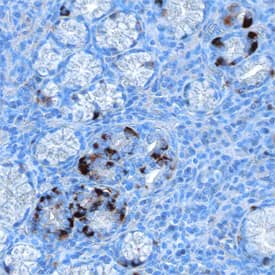Human MUC-4 Antibody
R&D Systems, part of Bio-Techne | Catalog # AF8195

Key Product Details
Species Reactivity
Applications
Label
Antibody Source
Product Specifications
Immunogen
Asn1137-Glu1317
Accession # Q99102
Specificity
Clonality
Host
Isotype
Scientific Data Images for Human MUC-4 Antibody
MUC‑4 in Human Stomach.
MUC-4 was detected in immersion fixed paraffin-embedded sections of human stomach using Goat Anti-Human MUC-4 Antigen Affinity-purified Polyclonal Antibody (Catalog # AF8195) at 1 µg/mL overnight at 4 °C. Tissue was stained using the Anti-Goat HRP-DAB Cell & Tissue Staining Kit (brown; Catalog # CTS008) and counterstained with hematoxylin (blue). Specific staining was localized to plasma membranes and cytoplasm of epithelial cells. View our protocol for Chromogenic IHC Staining of Paraffin-embedded Tissue Sections.Applications for Human MUC-4 Antibody
Immunohistochemistry
Sample: Immersion fixed paraffin-embedded sections of human stomach
Formulation, Preparation, and Storage
Purification
Reconstitution
Formulation
Shipping
Stability & Storage
- 12 months from date of receipt, -20 to -70 °C as supplied.
- 1 month, 2 to 8 °C under sterile conditions after reconstitution.
- 6 months, -20 to -70 °C under sterile conditions after reconstitution.
Background: MUC-4
MUC-4 (Mucin-4), also called ASGP (Ascites Sialoglycoprotein) is a highly glycosylated type I transmembrane glycoprotein that may be up to 950 kDa in its full-length, fully glycosylated form. Human MUC-4 cDNA encodes 2169 amino acids (aa) with a 28 aa signal sequence and a cleavage site that creates a 1416 aa soluble, extracellular alpha chain and a 725 aa single-pass transmembrane beta chain. Between aa 1072-1317 within the alpha chain, human MUC-4 shares 69% aa sequence identity with mouse and rat MUC-4. At least 14 soluble or transmembrane splice variants of 1102-2117 aa have been described, 5 of which contain the full sequence used as an immunogen. MUC-4 can serve as a ligand for the oncogenic receptor ErbB2 and a modulator of its phosphorylation and signaling. MUC-4 is frequently aberrantly expressed in epithelial tumors and can promote tumor growth and metastasis.
Long Name
Alternate Names
Gene Symbol
UniProt
Additional MUC-4 Products
Product Documents for Human MUC-4 Antibody
Product Specific Notices for Human MUC-4 Antibody
For research use only
